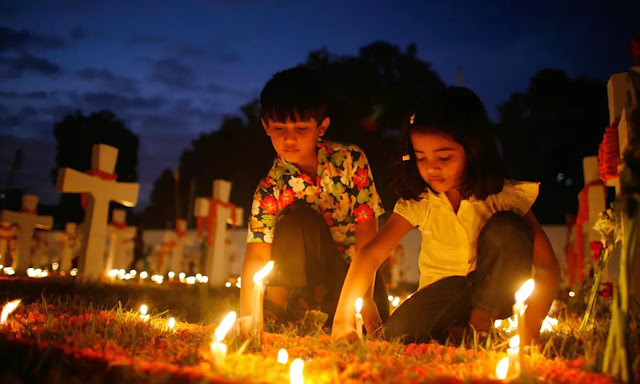All Saints' Day and All Souls' Day are both important Christian holidays, particularly within the Catholic Church, and they both focus on honoring the deceased. However, they differ in their specific focus and observance.
All Saints' Day (November 1st)
- Also known as All Hallows' Day, it is a solemn feast dedicated to all the saints, known and unknown, who have attained heaven.
- This day commemorates the lives of all the saints, including those who are not formally recognized or canonized by the Church.
- It's a time to honor and celebrate the lives of holy men and women throughout history, acknowledging their contributions to the faith and serving as role models for Christian life.
The origins of All Saints' Day can be traced back to early Christianity. The specific history and development of this feast are intertwined with the evolution of the Christian church and its practices. The concept of honoring saints and martyrs dates back to the earliest days of the Christian faith.
It can be linked to the early Christian tradition of commemorating martyrs who died for their faith. The earliest known observance of a feast in honor of all saints dates to the fourth century when the Eastern Church celebrated a common feast for all martyrs.
However, the establishment of a specific date for All Saints' Day is attributed to Pope Gregory III (731-741) when he dedicated a chapel in Rome to all saints and fixed the date of November 1st for the celebration.
The choice of November 1st for this feast is believed to have been influenced by various factors, including the dedication of the Pantheon in Rome to Christian worship in the 7th century, which was dedicated to the Blessed Virgin and all martyrs. This dedication likely influenced the choice of November 1st as the date for All Saints' Day. Additionally, the proximity to the Celtic festival of Samhain may have played a role, as All Saints' Day provided an alternative Christian celebration to the pagan festival.
The feast of All Saints was eventually adopted by the Western Church and spread throughout the Christian world, becoming an important and widely celebrated feast day. Over time, it evolved into a day to honor not just martyrs but all known and unknown saints who had achieved heaven, emphasizing the belief in the communion of saints.
Throughout history, various customs and traditions have developed around All Saints' Day, including special church services, prayers, and the veneration of saints, reflecting the significance of this day in Christian religious practice.
All Souls' Day (November 2nd)
- This day is dedicated to praying for the souls of all the faithful departed who have not yet reached heaven, particularly those in purgatory.
- All Souls' Day is a day of remembrance and prayer for deceased relatives and friends, offering prayers for their souls and asking for their peaceful rest and eventual entrance into heaven.
- It's a time for believers to remember and honor their departed loved ones, reflecting on the transient nature of life and the hope of the resurrection.
All Souls' Day is a Christian tradition that focuses on praying for the souls of the departed. Its history is closely linked to the commemoration of the faithful departed and the development of Christian beliefs about the afterlife.
The early Christian Church held prayers and commemorations for the deceased, and by the early Middle Ages, there were already practices and traditions dedicated to remembering and praying for the souls of the departed. The exact origins of All Souls' Day are not as precisely documented as some other Christian celebrations.
However, the formal establishment and widespread recognition of All Souls' Day as a specific feast in the Christian calendar are often attributed to St. Odilo, the Abbot of Cluny, a Benedictine monastery in France. He instituted an annual commemoration of all the faithful departed in the Cluniac monasteries under his jurisdiction. This act of dedicating a specific day to pray for the souls of the departed was in response to the increasing number of deceased individuals who were not considered saints and didn’t have a designated day of remembrance.
The date of November 2nd was chosen, which was likely influenced by the proximity to All Saints' Day on November 1st. All Saints' Day honored known and recognized saints, while All Souls' Day was intended to remember all departed souls, especially those in purgatory, awaiting entry into heaven.
Over time, the observance of All Souls' Day spread throughout the Western Christian Church. It became an established tradition for Christians to visit cemeteries, light candles, and offer prayers for their deceased loved ones. The day was and continues to be an occasion to reflect on mortality, pray for the souls of the departed, and express hope in the resurrection and the eventual union of the departed with God.
All Souls' Day stands as a significant moment in Christian practice, emphasizing the belief in the afterlife and the importance of prayer and remembrance for those who have passed away. All Souls' Day is marked by prayers for the souls of the departed and often involves visits to cemeteries and graves.
These two days work together to honor and remember both the known and unknown saints as well as all departed faithful, emphasizing the belief in the communion of saints and the unity of the living and the dead within the Christian faith.


Comments
Post a Comment